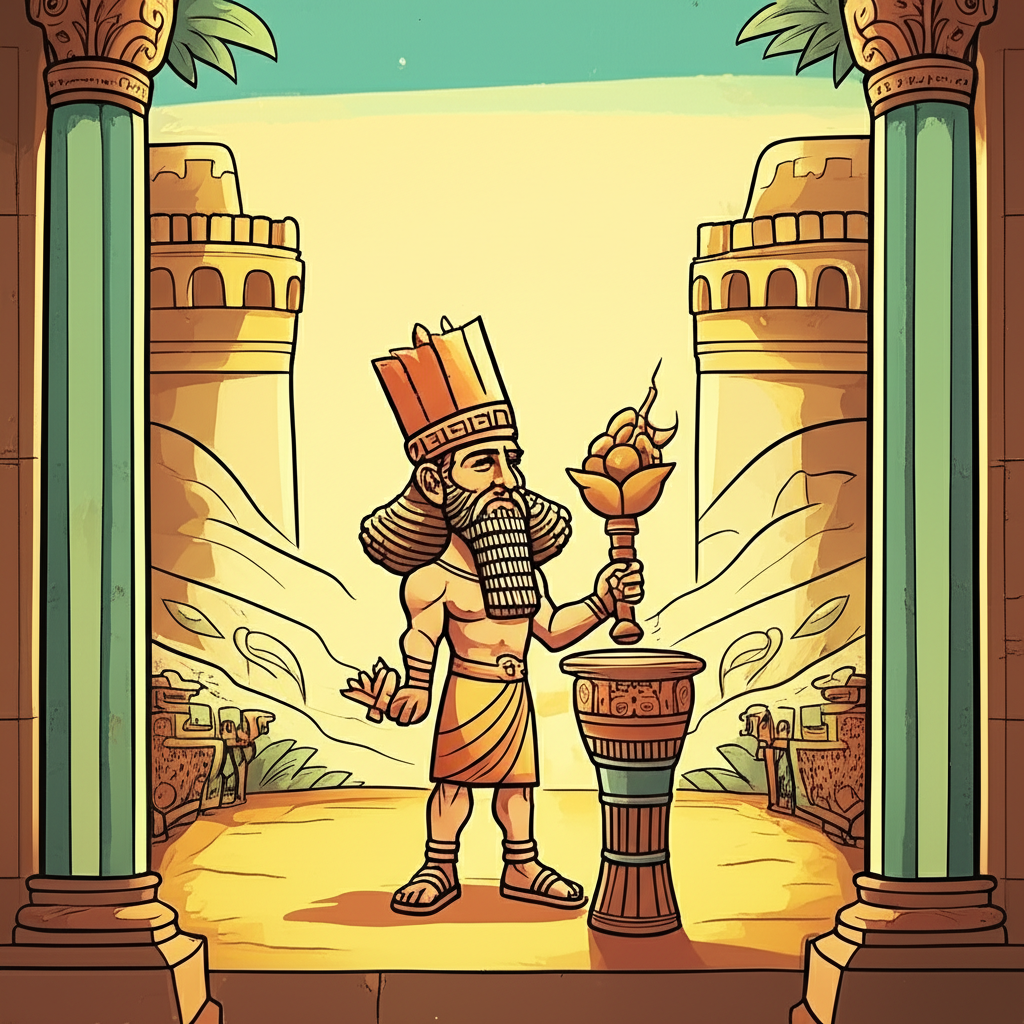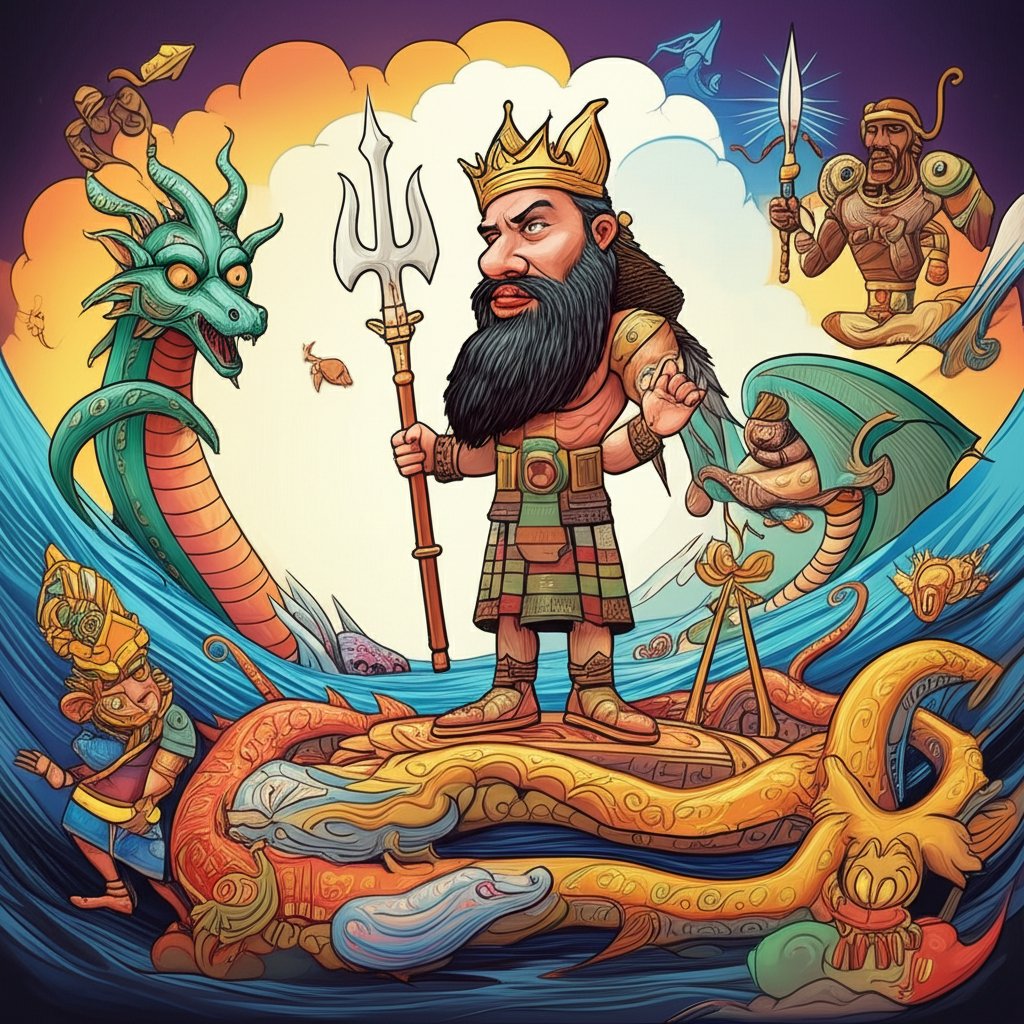
From the sun-baked plains of ancient Mesopotamia, a land cradled between the life-giving Tigris and Euphrates rivers, comes a tapestry of stories woven from the threads of human imagination and a profound attempt to understand the world. Among these narratives, the epic of Enuma Elish stands as a monumental testament to the worldview of its creators, offering a glimpse into their understanding of creation, order, and the powerful forces they believed shaped their existence. This is not a record of historical events or divine pronouncements, but rather a profoundly influential mythological account, a traditional story told by ancient peoples to grapple with the mysteries of the cosmos.
The cultural era that birthed the Enuma Elish, primarily the Babylonian civilization flourishing in the second millennium BCE, was one deeply intertwined with the natural world. Life was a constant negotiation with the unpredictable forces of nature: the floods that could bring both bounty and destruction, the scorching heat of the desert, the raw power of storms. Their worldview was one populated by potent, anthropomorphic deities who embodied these phenomena. The sky, the earth, the waters – all were animated by divine will. Humans, in this context, were often seen as beings created to serve the gods, to labor and appease them, thereby maintaining a fragile cosmic balance. The Enuma Elish, therefore, reflects a society seeking to explain its origins and justify its place within a universe governed by powerful, often capricious, celestial beings.
At the heart of many Mesopotamian myths, and a central figure in the Enuma Elish, is Enlil. He is not to be understood as a deity to be worshipped or believed in, but rather as a powerful mythological construct, a personification of immense, untamed forces. Enlil is often depicted as the "Lord of the Wind," the "King of the Gods," and the "Controller of Destinies." His symbolic attributes are those of authority, power, and sometimes, destructive might. He embodies the roaring tempest, the sweeping gale, the breath of life and the harbinger of ruin. His throne is often associated with the summit of the cosmos, from which he surveys and dictates the affairs of both gods and mortals. His anger could unleash devastating storms, while his favor could bring prosperity. He represents the awe-inspiring, often terrifying, power of the natural world as perceived by the ancient Mesopotamians.
The narrative of Enuma Elish, in its most commonly known Babylonian version, begins not with Enlil, but with the primordial watery abyss, Apsu, and the salty sea, Tiamat. From their mingling, the first gods emerge, vibrant and boisterous. Their youthful exuberance, however, becomes a source of irritation for Apsu, who plots their destruction. It is Ea, the wise god of waters and magic, who thwarts Apsu’s plan, slaying him and taking his domain. From Apsu’s essence, Ea then fathers Marduk, the eventual hero of the epic.
The story truly escalates with Tiamat, Apsu’s consort, who, enraged by the death of her mate and the continued disruption caused by the younger gods, gathers an army of monstrous beings to exact vengeance. It is at this critical juncture that Enlil’s role, while not always the primary actor in every retelling, becomes intertwined with the escalating conflict. In some versions, Enlil is a powerful figure within the pantheon, a formidable god whose authority is challenged by Tiamat’s rebellion. He represents the established order, the divine hierarchy that Tiamat seeks to dismantle. While Marduk ultimately rises to confront Tiamat, Enlil’s presence signifies the cosmic stakes of the battle – the potential collapse of the divinely ordained structure.
The climax of the Enuma Elish is the titanic struggle between Marduk and Tiamat. Marduk, empowered by the other gods, faces the monstrous chaos that Tiamat embodies. He unleashes his mighty winds, symbolic of Enlil’s own dominion over the air, and captures Tiamat, splitting her in two. From her colossal corpse, Marduk fashions the heavens and the earth, establishing order from primordial chaos. He then creates humanity from the blood of Tiamat’s rebellious general, Kingu, to serve the gods and bear their burdens. This act of creation and establishment of order is often seen as a defining moment, a victory of divine intelligence and power over primeval, untamed forces.
The symbolism within the Enuma Elish is rich and multifaceted. Tiamat, the salt-water goddess, represents the untamed, chaotic primordial ocean, the source of all existence but also the potential for boundless destruction. Her monstrous army symbolizes the forces that threaten order and stability. Marduk, the champion, represents the triumph of intellect, organization, and divine will in bringing structure to the universe. Enlil, as the god of wind and often a figure of authority and power, embodies the potent, elemental forces of nature that can be both destructive and life-giving. His association with the wind can symbolize the divine breath that animates creation, or the destructive force that can sweep away all in its path. The epic, therefore, can be seen as a symbolic representation of the ongoing struggle between order and chaos, the creation of the cosmos from a formless void, and the establishment of a divinely sanctioned hierarchy. It also speaks to the Mesopotamian understanding of the human condition, the necessity of labor and service to maintain cosmic harmony.
In modern times, the Enuma Elish continues to resonate, not as a literal account, but as a powerful piece of literary and cultural heritage. Its influence can be seen in various forms: in academic studies of ancient Near Eastern civilizations, in scholarly analyses of comparative mythology, and even in fictional works that draw inspiration from its epic scope and thematic depth. While not a direct source for mainstream modern religions, its concepts of creation from chaos and the establishment of order echo in various cultural narratives. It is a testament to the enduring power of storytelling and the human impulse to make sense of existence.
It is crucial to reiterate that the Enuma Elish is a cultural story, a product of ancient imagination and a reflection of a particular worldview. It is not a statement of factual truth, nor is it a divine mandate. As Muslims, we recognize that the true Creator and Sustainer of the universe is Allah, the One God, whose power and dominion are absolute and beyond human comprehension. The Enuma Elish, therefore, serves as a fascinating window into the past, a testament to the rich tapestry of human cultural heritage and the enduring tradition of storytelling that seeks to explore the deepest questions of existence. It reminds us of the power of imagination and the diverse ways in which humanity has sought to understand its place in the grand, unfolding narrative of the cosmos.




